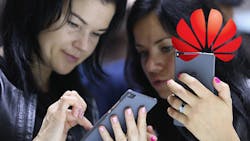Huawei Technologies Co. pledged to overhaul its culture and rethink the way it conducts business, expecting global uncertainty to mount in 2017 after sales growth slowed.
China’s largest telecommunications equipment maker expects a 32% rise in revenue to 520 billion yuan ($74.83 billion) in 2016, rotating CEO Eric Xu said. That’s down from the 37% growth it posted in 2015. The company now needs to re-tool its management approach to zero in on customers’ needs, while staunching costs and avoiding “blind optimism and rhetoric.”
Huawei, which debuted its first Android device in 2009 and is now the largest smartphone maker after Apple Inc. and Samsung Electronics Co., has made significant inroads into markets from the U.S. to Europe. But Chinese rivals from Oppo to Vivo have taken the lead back home and its business of selling networking gear to wireless carriers is vulnerable to political swings. Huawei’s consumer business, which includes mainly smartphones, probably grew sales 42% to 178 billion yuan ($25.61 billion) in 2016, divisional CEO Richard Yu said in a separate memo.
“The year 2016 has seen a flock of black swans — both political and economic — sweep across the globe,” Xu said in a memo to staff that was posted on the company website. “In 2017, we will face even greater global political and economic uncertainties.”
Those include a rise in costs that outpaced revenue and gross margin growth in 2016. Xu outlined a laundry list of time- and money-wasting activities to root out, including “empty talks in offices that are far removed from actual business” and “fancy” internal promotional videos and slides. He wants more independent thinking and visits to key operations from base stations to stores.
More fundamentally, Xu — one of several executives that rotate in and out of the top position — urged a shift in attitude and mindset from merely responding to customers to actively evolving into a technology leader. He wants to build research and innovation centers around the world. And he warned of internal disruption as employees are trained and re-assigned to the field.
“Our human resource policy should help reduce entropy in our workforce,” he said.
Founded in 1987 by former army engineer Ren Zhengfei, Huawei is one of several Chinese companies trying to compete in the global technology market. It remains a global leader in carrier equipment, and its latest smartphones — the P9 and P9 Plus — have proved popular in higher-end markets. It posted a 37% jump in overall 2015 revenue to 395 billion yuan ($56.84 billion), and shipped roughly 100 million smartphones globally.
Smartphone sales are expected to grow a single-digit percentage in 2016 for the first time, according to IT researcher Gartner. Huawei’s consumer mobile division, riding the strong reception for its marquee phones, far outpaced that: it probably expanded shipments by 29%t to 139 million units this year, Yu said.
The goal is to become one of two or three surviving players after a global industry shake-out over the coming three to five years, the consumer division chief added. To get there, Huawei must continue to evolve into a true premium brand and adapt to a rapidly shifting market, rotating CEO Xu said.
“To cure an illness, you have to treat the root cause,” Xu said. “Past success is not a reliable indicator of the future, and a long list of accomplishments might end up nothing more than an epitaph.”
About the Author
Bloomberg
Licensed content from Bloomberg, copyright 2016.
